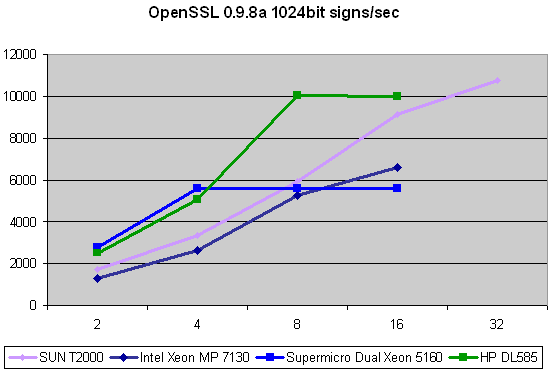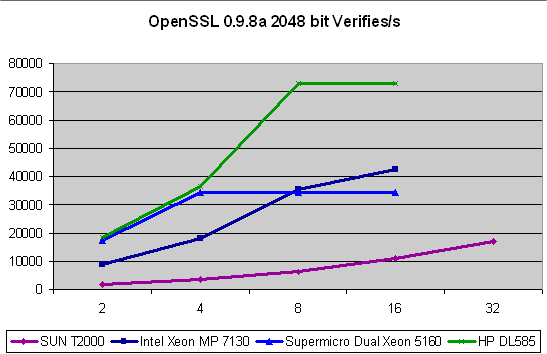Intel's newest Quad Xeon MP versus HP's DL585 Quad Opteron
by Johan De Gelas on November 10, 2006 12:00 PM EST- Posted in
- IT Computing
Secure Socket Layers RSA Performance
Secure web communication is possible through the utilization of the Secure Sockets Layer (SSL). Using "openssl speed rsa" we can measure the number of RSA public keys (sign) operations that a system can perform per second using OpenSSL 0.9.8a. Both verifies/s and signs/s benchmarks are rather synthetic, but give an idea of the "pure" encrypting and decrypting speed.
Note that this time we did not compile OpenSSL with specific flags for each architecture (march="xxx") but we used the same flags on each CPU. We feel that this better reflects the real world use of SSL as most people do not know the specific CPU architecture they are running on. So we compiled with the following on all x86 systems:

Compared to our previous findings, the Opteron 2.4 GHz no longer (slightly) beats the 3 GHz Xeon DP 5160. This is the result of replacing a "compiled specifically for each architecture" binary with a binary that is compiled with the more generic -o3 optimization, which as stated is more realistic. Still, our previous conclusion stands: clock for clock, the Opteron is quite a bit better at this than the Xeon "Core" architecture (Xeon 5160) and a lot better than the Xeon "NetBurst" architecture (Xeon MP 7130). Despite being clocked 20% lower than the Xeon 5160, it is only 9% slower at 4 threads. The 8 MAUs of the Sun T1 still give the 1 GHz Sun the edge when we fire off 32 "SSL RSA Signing" threads.
In the case of doing verifies, the server has to authenticate the identity of the client. This is a lot less intensive, and we show you the verifies/s numbers at 2048 bits. At 1024 bits length, both the Woodcrest and Opteron were able to verify more than 50,000 keys per core, and that is a hard limit of the OpenSSL benchmark.

Again, the Opteron takes the lead. Encrypting or signing will slow down a server much quicker than verifying keys, so this benchmark is of smaller importance than the sign/s benchmark.
Secure web communication is possible through the utilization of the Secure Sockets Layer (SSL). Using "openssl speed rsa" we can measure the number of RSA public keys (sign) operations that a system can perform per second using OpenSSL 0.9.8a. Both verifies/s and signs/s benchmarks are rather synthetic, but give an idea of the "pure" encrypting and decrypting speed.
Note that this time we did not compile OpenSSL with specific flags for each architecture (march="xxx") but we used the same flags on each CPU. We feel that this better reflects the real world use of SSL as most people do not know the specific CPU architecture they are running on. So we compiled with the following on all x86 systems:
gcc -fPIC -DOPENSSL_PIC -DZLIB -DOPENSSL_THREADS -D_REENTRANT -DDSO_DLFCN -DHAVE_DLFCN_H -m64 -DL_ENDIAN -DTERMIO -O3 -Wa,-noexecstack -g -Wall -DMD32_REG_T=int -DMD5_ASM
Compared to our previous findings, the Opteron 2.4 GHz no longer (slightly) beats the 3 GHz Xeon DP 5160. This is the result of replacing a "compiled specifically for each architecture" binary with a binary that is compiled with the more generic -o3 optimization, which as stated is more realistic. Still, our previous conclusion stands: clock for clock, the Opteron is quite a bit better at this than the Xeon "Core" architecture (Xeon 5160) and a lot better than the Xeon "NetBurst" architecture (Xeon MP 7130). Despite being clocked 20% lower than the Xeon 5160, it is only 9% slower at 4 threads. The 8 MAUs of the Sun T1 still give the 1 GHz Sun the edge when we fire off 32 "SSL RSA Signing" threads.
In the case of doing verifies, the server has to authenticate the identity of the client. This is a lot less intensive, and we show you the verifies/s numbers at 2048 bits. At 1024 bits length, both the Woodcrest and Opteron were able to verify more than 50,000 keys per core, and that is a hard limit of the OpenSSL benchmark.

Again, the Opteron takes the lead. Encrypting or signing will slow down a server much quicker than verifying keys, so this benchmark is of smaller importance than the sign/s benchmark.










88 Comments
View All Comments
DigitalFreak - Friday, November 10, 2006 - link
No, the DL580 is a quad socket as well.Although it's probably what you already had on hand, the new DL585G2 offers a lot of what you said the DL585 lacked (PCI-E, etc.)
JohanAnandtech - Saturday, November 11, 2006 - link
My bad, by reading "Woodcrest" (which is wrong) I thought there was some DL580 model that was dual socket that I wasn't aware off. So basically the DL580G4 is Tulsa based, I think the DL585 is a more interesting competitor for our Intel server.The fastest DL580G3 are all Paxville (or even older based) so not interesting for comparison... the spec numbers make it clear it is pretty bad performer.
severian64 - Friday, November 10, 2006 - link
Jason,If you are read this, please include the following benchmarks on Windows for the Quad Intel vs Quad Operton if you do a quad shootout on windows:
1) Windows 2003 Server x86-64 , SQL Server 2005 x86-64
2) Windows 2003 Server x86-32, SQL Server 2005 x86-32, Exchange 2003
For the SQL Server 2005 tests please test all aspects of the database such as SQL Server Integration Services not just SQL statements.
Also, the tests would be most usefull if they were done with 4GB , 8GB and 16GB configs.
Thanks,
Severian.
Brokersml - Wednesday, March 4, 2020 - link
https://currency-trading-brokers.com/forex-compari...Topteni221 - Tuesday, March 17, 2020 - link
Hi folks, just to share some useful website resource here, thanks!The https://ytmp3.ch/">Ytmp3 online video downloader support all web browsers to Download YouTube to MP3 & MP4 Official
https://y2mate.ch/">Y2mate website.
Best https://keepvid.ch/">Keepvid website.
Top ten https://topten.ai/image-upscalers-review/">image upscaler review.
Best https://videoeditor.best/">video editor reviews of 2020.
Easy online https://memegenerator.site/">meme generator sites.
Keepvid688i - Wednesday, March 18, 2020 - link
The Best https://topten.ai/video-enhancer-review/">Video Enhancer Software reviews 2020.The Best free online https://keepvid.ch/en/youtube-to-mp4">YouTube to mp4 tools.
New https://flvto.ch/">youtube converter website.
The Best and stable https://2conv.ch/">YouTube Downloader
New https://ytmp3.ch/">ytmp3 website
https://ja.dvdfab.cn/ura/pornhub-adult-video-downl...">Pornhub ダウンロード
BettyNuh - Thursday, March 19, 2020 - link
MEET HOT LOCAL GIRLS TONIGHT WE GUARANTEE FREE SEX DATING IN YOUR CITY CLICK THE LINK: http://veryhotgirls.best/Y2mateS628 - Tuesday, March 24, 2020 - link
Hi, just came across your website, really appreciate your works!Would like to post some useful links, hope you like it.
https://flvto.ch/">Youtube Converter
https://y2mate.ch/">y2mate
https://keepvid.ch/en/youtube-video-downloader">Youtube video downloader
https://ytmp3.ch/">Youtube to mp3
https://listentoyoutube.ch/ja/youtube-to-mp3-sites">YouTube MP3 変換
https://youtufab.com/download-youtube-mp4-1080p">Youtube to mp4
Steveinema - Tuesday, March 31, 2020 - link
General specialist manhattanThe part of General building New York is to transfer to the client the whole center overall, and certainly not such as separately done job. Of certain relevance is actually the job of the basic professional during the course of the big development of apartment of residential style, commercial facilities, business centers.
https://grandeurhillsgroup.com/">hospitality interior new york;
Industrial structures.
Today, the list of building companies consists of different business interior design. An financier as well as a consumer can invest a considerable amount of time-solving on all company concerns. A even more reasonable service is to entrust this function to General building NY.
Keepvid343r - Tuesday, March 31, 2020 - link
Hi guys, just came across your wonderful website and would like to share some free userful resource.The Best free online https://keepvid.ch/pt/youtube-to-mp3">YouTube mp3 tools.
New https://flvto.ch/de/youtube-converter">youtube converter website.
The Best and stable https://2conv.ch/">video Downloader
New https://ytmp3.ch/">youtube to mp3 website.